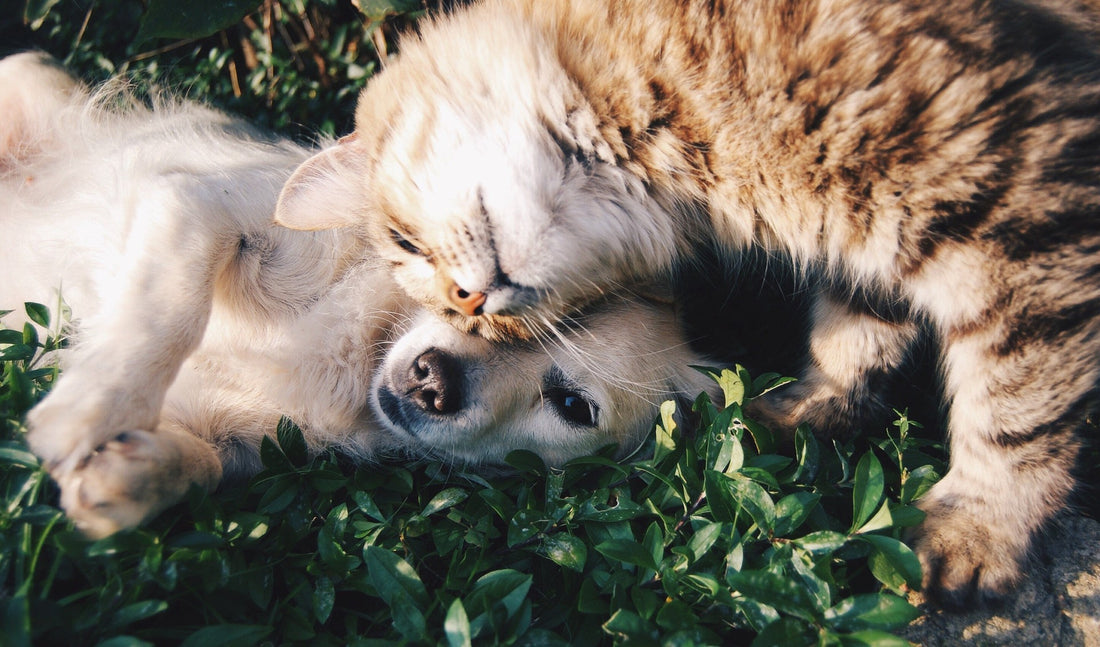One of our most frequently asked questions concerns the safety of incense and other essential oil-based products around pet cats, dogs, birds, reptiles, and more. While Sea Witch Botanicals exclusively creates products with natural, plant-derived ingredients that are safe for human health, our bodies and senses are built quite differently from those of the beloved animals with whom we share our lives and homes. Therefore, a different set of guidelines is needed when it comes to supporting their health, too.
Instead of synthetic fragrances, we use essential oils to create our signature aromatic blends. Essential oils are highly concentrated, volatile plant extracts that have been used for thousands of years throughout the world for everything from freshening one’s space to treating myriad health conditions. These compounds may be generally beneficial to human health, yet the same cannot always be said for other animals.
Throughout this page we will review different uses of essential oils and how the oils can affect your pets. While this article focuses on essential oil safety for dogs and cats, it’s important to recognize that all animals have extremely sensitive bodily systems, and information pertaining more directly to our furry friends may not be the same for those with feathers or scales.
PLEASE NOTE: This page is not meant to diagnose animal conditions of any kind, or serve as a substitute for veterinary advice. If you have concerns for your animal’s health, please contact your veterinarian immediately, call the ASPCA Animal Poison Control Center at (888) 426-4435, or visit www.petpoisonhelpline.com for assistance.
Header image by Krista Mangulsone on Unsplash.
* * *
Understanding the Available Information About Essential Oils and Pets
Photo by Kadarius Seegars on Unsplash.
As essential oils skyrocket in popularity, both as natural fragrance alternatives and as holistic medicine treatments, it’s necessary to acknowledge that the amount of research done into the relationship between essential oils and animals remains minimal.
We know certain oils can be toxic to pets; we have anecdotal evidence that some animals can live harmoniously alongside essential oil products; we’ve even seen some professionals reporting success in treating animal health conditions with essential oils; yet this field continues to be markedly understudied. More information is needed in order to provide a proper resource for pet parents in navigating the world of essential oils.
It is also important to note that research on the relationship between synthetic fragrances and animals is even more scarce. Given the pervasiveness of fragrance chemicals we already know to be toxic to human health, such as parabens, phthalates, formaldehyde, synthetic musks, and thousands more, learning about these chemicals’ effects on animals is just as important as investigating the positive and negative impacts of essential oils on animal health.
Essential Oil Safety

Photo by Kelly Sikkema on Unsplash.
Ingestion, skin exposure, and inhalation all have the potential to create toxicity in your animal’s health.
With candles and incense, the main concern surrounds your pet inhaling essential oils that are either toxic to them or being given off in too great a quantity for them to handle. Always burn candles and incense in a well-aerated space and out of your animals’ reach, and never leave anything burning unattended.
We also recommend creating either a pet-free zone in your home where your essential oil products can be enjoyed worry-free, or a pet haven zone to which your animals can slip away while you’re burning essential oil incense or candles.
With salves, soaps, and solid perfumes, the main concern surrounds your pet licking essential oils off the product or your skin. Even with oils that may not be toxic to the animal when used correctly, your pet risks being poisoned from ingesting even trace amounts of essential oils. In their high concentrations, all essential oils are corrosive to gastrointestinal tissues in any animal—including us!
We recommend opting for products free from potentially toxic oils and/or practicing extreme caution when using these topical essential oil products in the vicinity of your pet. Make sure all products are stored safely away from your animals, and that the animals do not lick your skin in areas where essential oils have been applied. For instance, if you have a dog and choose to use our solid perfumes, consider applying the fragrance behind your ear rather than at the inside of your wrist, and be sure to wash your hands after applying.
With essential oil diffusers or sprays (like our scented veils), the main risk is in diffusing oils that your pet may inadvertently ingest. Essential oil diffusers or sprays expel tiny water droplets saturated with oils throughout the room, landing on every surface nearby. If your pet were to lick the floor or another surface, or roll around on the carpet and then lick themselves for grooming, they are at risk of ingesting the essential oils diffused in that space.
To minimize the risk of oil ingestion, we recommend opting for products free from potentially toxic oils, and/or diffusing or spraying them in a pet-free zone where your animal cannot enter.
When it comes to using essential oils to treat animal health conditions, we strongly recommend you confer with your veterinarian. Only certain essential oils may benefit your pet, and the doses used must be precise. Especially given that every animal has different sensitivities, conditions, and needs, trained professional action is required to effectively administer essential oil therapy to animals.
Essential Oils & Dogs

Photo by Aldo Houtkamp on Unsplash.
Oil toxicity varies by species of pet. According to Michelson Found Animals and the Cabbagetown Pet Clinic in Ontario, Canada, the following essential oils are toxic to dogs:
- Anise
- Birch or Sweet Birch
- Cinnamon
- Citrus (including Bergamot, Grapefruit, Lemon, Orange, etc)
- Clove
- Garlic
- Juniper
- Pennyroyal
- Peppermint
- Pine
- Tea Tree (melaleuca)
- Thyme
- Wintergreen
- Yarrow
- Ylang Ylang
While most Sea Witch products contain one or more of these ingredients, our founders have used our essential oil products in well-aerated spaces and out of reach of their cats and dogs for years without the animals showing any negative side effects. We acknowledge this is anecdotal evidence and recognize each animal has different sensitivities, conditions, and needs. Please contact your veterinarian if you have concerns for your animal’s health.
(Note: By comparison, the founders do not use essential oil products like incense or candles in the house since welcoming their bird, Birt, into their home.)
Essential Oils & Cats

Photo by Jacob Norrie on Unsplash.
Oil toxicity varies by species of pet. According to Michelson Found Animals and the Cabbagetown Pet Clinic in Ontario, Canada, the following essential oils are toxic to cats:
- Birch or Sweet Birch
- Cinnamon
- Citrus (including Bergamot, Grapefruit, Lemon, Orange, etc)
- Clove
- Eucalyptus
- Lavender
- Oregano
- Pennyroyal
- Peppermint
- Pine
- Tea Tree (melaleuca)
- Thyme
- Wintergreen
- Ylang Ylang
While most Sea Witch products contain one or more of these ingredients, our founders have used our essential oil products in well-aerated spaces and out of reach of their cats and dogs for years without the animals showing any negative side effects. We acknowledge this is anecdotal evidence and recognize each animal has different sensitivities, conditions, and needs. Please contact your veterinarian if you have concerns for your animal’s health.
(Note: By comparison, the founders do not use essential oil products like incense or candles in the house since welcoming their bird, Birt, into their home.)
* * *
Signs of Essential Oil Poisoning in Pets
If you have concerns about your animal’s health and/or notice they exhibit any of the following symptoms, please contact your veterinarian immediately, call the ASPCA Animal Poison Control Center at (888) 426-4435, or visit www.petpoisonhelpline.com for assistance.
VCA Animal Hospitals lists the following as signs of essential oil poisoning in pets:
- fragrance or scent on hair, coat, skin, or breath
- difficulty breathing
- difficulty walking or uncoordinated gait
- drooling
- lethargy or weakness
- muscle tremors
- pawing at the mouth or face
- redness or burns on the lips, gums, tongue, or skin
- vomiting (you may detect the smell of essential oils in the vomit)
If you suspect your animal may have essential oil poisoning, they recommend taking the following actions, in addition to contacting your veterinarian or an animal poison helpline:
- do not induce vomiting or feed the animal activated charcoal, as their condition may worsen
- take the product with you to the veterinary clinic in a sealed container
- wash any product off of skin or fur using hand dishwashing detergent
VCA states that “fast and aggressive treatment is essential to prevent any toxic effects” when it comes to essential oil poisoning in pets. Resources for taking these necessary actions are listed below.
- ASPCA Animal Poison Control Center (APCC)
- APCC 24/7 hotline: (888) 426-4435 *consultation fee may apply
- Pet Poison Helpline
- Pet Poison Helpline 24/7 hotline: (855) 764-7661 *$85 fee will apply
* * *
Do you share your life with a different animal? Let us know what kinds of critter companions live in your home and we will work to expand this resource as best we can.






